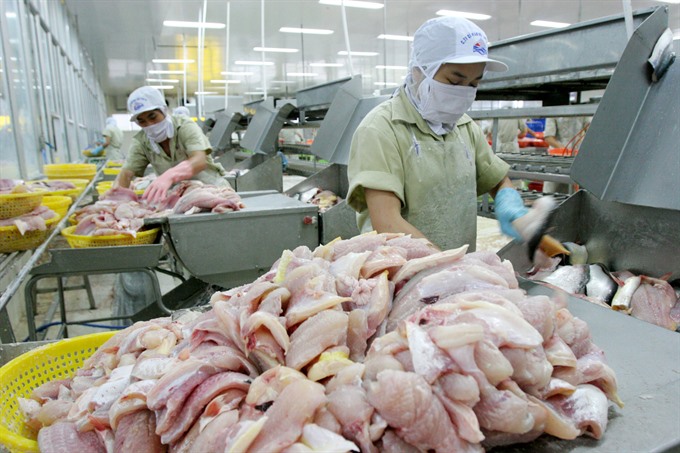 Economy
Economy

Việt Nam expects to gain a year-on-year increase of 6.6 per cent in export value of tra fish for this year to US$1.6 billion, according to the Ministry of Agriculture and Rural Development.
 |
| A tra fish export processing line at An Giang Fisheries Import-Export Joint Stock Company in the southern An Giang Province. The US is the largest export market of Vietnamese tra fish with an estimated export value of $360 million. — VNA/VNS Photo Phạm Hậu |
AN GIANG – Việt Nam expects to gain a year-on-year increase of 6.6 per cent in export value of tra fish for this year to US$1.6 billion, according to the Ministry of Agriculture and Rural Development.
The ministry released the figure at a conference reviewing production and consumption of tra fish this year held in An Giang Province on Wednesday, reported vov.vn.
At the conference, Minister of Agriculture and Rural Development Nguyễn Xuân Cường said the nation achieved slight growth in tra fish export value this year, despite many challenges in markets and climate change. This year, Vietnamese tra fish products were shipped to 140 markets, four more than last year.
The US was still the largest export market of Vietnamese tra fish with an estimated export value of $360 million, he said.
Next year, the domestic tra fish industry expects to have output of 1.1 million tonnes and will focus on improving quality of tra fish varieties and quality standards for production and promote co-operation among farming households to supply materials for processors of export tra fish, according to the ministry.
Vietnamese tra products had diversified and become more competitive but they still faced commercial and technical barriers in importing countries, Cường said.
Catfish inspection programme
In other developments, the Việt Nam Association of Seafood Exporters and Producers said many participants of a hearing entitled “Waste and Duplication in the USDA Catfish Inspection Program” held by US Energy and Commerce Committee’s Subcommittee on Health in Washington on December 7 opposed the catfish inspection programme.
At the hearing, Joseph Pitts, Chairman of the Subcommittee on Health, said the US already had a federal agency responsible for overseeing the safety and inspection of other types of seafood, the Food and Drug Administration (FDA), according to www.energycommerce.house.gov.
“As Members of the Health Subcommittee of the Energy and Commerce Committee with direct oversight of the FDA, it is illogical (and wasteful) that the US Department of Agriculture (USDA) would be given the exclusive authority to oversee and regulate catfish only, while the FDA regulates all other seafood,” said Pitts.
“Catfish is an extremely low risk food product. Explicitly creating a programme exclusively for catfish is unnecessary.”
“Since the very beginning of this transfer of regulation (from FDA to USDA) the justification was to ensure food safety. But USDA’s expertise is meat and poultry, not fish. Frankly, the real aim of this move was to hinder foreign firms importing catfish so they would be unable to compete with domestic catfish farmers. Such actions could trigger a World Trade Organisation lawsuit.”
Pitts also said another concerning aspect was that this USDA programme had cost American taxpayers an exorbitant amount of money without much to show for it.
The US Government Accountability Office (GAO) issued no less than nine reports indicating that the responsibility for inspecting catfish should not be assigned to the USDA, he said.
Kimberly Gorton, President and Chief Executive Officer of Slade Gorton & Co., Inc said her company was one of America’s largest distributors and manufacturers of fresh, frozen and premium value-added seafood products.
“The USDA programme is a complete waste of tax dollars. Our government is already squeezing job-creating small businesses, and this programme is a needless, costly and duplicative regulation that burdens my company and all other seafood companies,” Gorton said.
Ending this programme and its bloated USDA payroll would show that Congress was listening and responding to their concerns, she said. - VNS




